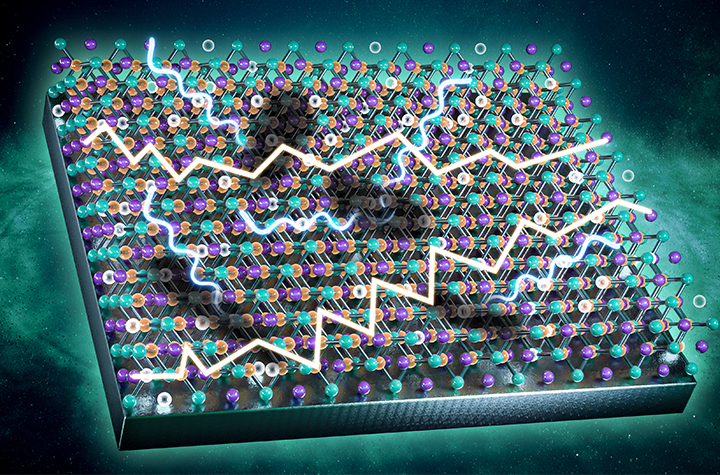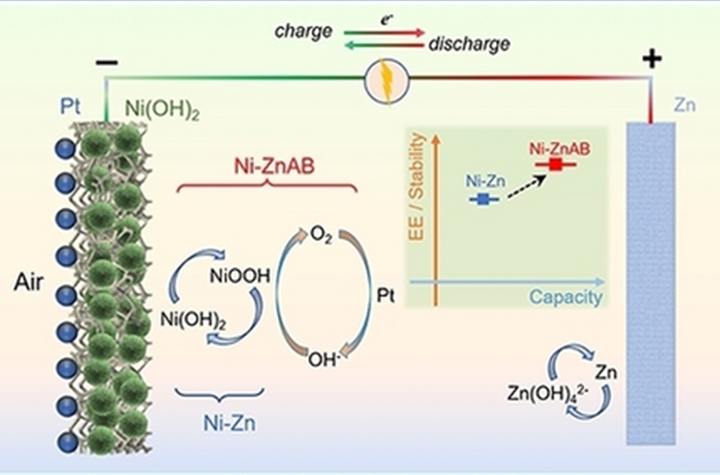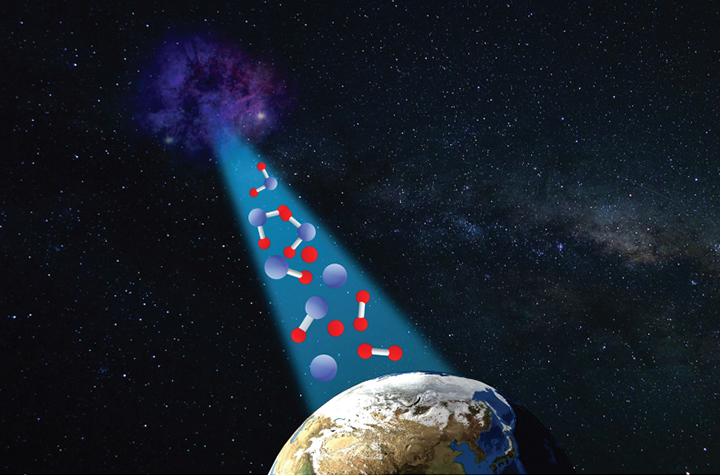Research News
-
 04 06, 2023Chinese Researchers Achieve Superionic Hydride Ion Conduction at Ambient TemperaturesMaterials that can conduct negatively charged hydrogen atoms at ambient conditions would pave the way for advanced clean energy storage and electrochemical conversion technologies. A research team from the Chinese Academy of Sciences demonstrated a technique that enables a room-temperature all-solid-state hydride cell by introducing and exploiting defects in the lattice structure of rare earth hydrides.
04 06, 2023Chinese Researchers Achieve Superionic Hydride Ion Conduction at Ambient TemperaturesMaterials that can conduct negatively charged hydrogen atoms at ambient conditions would pave the way for advanced clean energy storage and electrochemical conversion technologies. A research team from the Chinese Academy of Sciences demonstrated a technique that enables a room-temperature all-solid-state hydride cell by introducing and exploiting defects in the lattice structure of rare earth hydrides.
Materials that can conduct negatively charged hydrogen atoms in ambient conditions would pave the way for advanced clean energy storage and electrochemical conversion technologies. A research team from the Dalian Institute of Chemical Physics (DICP) of the Chinese Academy of Sciences (CAS) demonstrated a technique that enables a room-temperature all-solid-state hydride cell by introducing and exploiting defects in the lattice structure of rare earth hydrides.
Their study was published in Nature on April 5.
Solid materials that conduct lithium, sodium and hydrogen cations have been used in batteries and fuel cells. Under certain conditions, some of the materials transition to superionic states where ions move as fast as they do in liquids by skipping through the rigid crystal structure. This phenomenon is advantageous for chemical and energy conversions as it allows ions to move without a liquid or soft membrane to separate the electrodes. However, few solid-state materials can reach this state under ambient conditions.
"Materials that exhibit superionic conduction at ambient conditions would provide huge opportunities for constructing brand new all-solid-state hydride batteries, fuel cells and electrochemical cells for the storage and conversion of clean energy," said Prof. CHEN Ping, study author from DICP.
With strong reducibility and high redox potential, hydride ion (H-) conductors have emerged as promising candidates for this technology. Several H- conductors have already been developed in recent years, including alkaline earth metal hydrides and oxyhydrides of alkaline earth and rare earth metals, which are known for fast hydrogen migration. But none of the materials developed could achieve superionic conduction at ambient conditions —until the DICP team took a new approach.
The DICP research team targeted the structure and morphology of trihydrides — hyrdrides containing three atoms of hydrogen per molecule — of certain rare earth elements (REHx), including Lanthanum (La).
Strategies to enhance electronic conductivities typically seek to diminish crystallographic imperfections for applications like metallic nanowire interconnects and nanostructured photovoltaic semiconductors. In this study, however, the research team purposely created abundant discrete nanosized grains and lattice defects to disturb the path of electron transport in REHx and suppress the electronic conductivity. This is different from engineering conventional materials for ion conduction, which relies upon the consistent structure of high crystallinity.
The research team observed how H- ions diffused easily in REHx lattices by hopping between octahedral and tetrahedral sites in the crystal and across interfaces or grain boundaries. Electrons, on the other hand, encountered substantial scattering at grain boundaries, particle surfaces and other traps, which brought down the electronic conductivities by three to five orders of magnitude from those of their well-crystallized counterparts.
"By creating nano-sized grains, defects and other crystalline mismatched zones in a known ionic-electronic mixed conductor, we demonstrated that the electronic conductivity of LaHx (x ≈ 2.94) can be largely suppressed by five orders of magnitude," said CHEN. "Engineering such a material could transform LaHx into a pure hydride ion conductor with record high conductivities in the temperature range of -40 to 80 ℃."
The researchers effectively suppressed electron conduction of LaHx by decreasing the particle size and distorting the lattice via high-energy ball milling, which involves subjecting the material to high-energy collisions. With fast H- conduction and a high ion transfer number, the deformed LaHx material would enable a hydride ion battery to operate at room temperature or lower.
"This work demonstrates the effectiveness of lattice deformation in suppressing electron conduction in REHx," said CHEN.
The researchers plan to explore the physics underneath the phenomenon and extend the method developed in this study to other hydride materials to broaden the material scope for pure H- conductors.
"Our near-term goal is to demonstrate a brand new all-solid-state hydride ion battery that is of practical potential," said CHEN.
This work was jointly supported by the National Key Research and Development Program of China, the National Natural Science Foundation of China, Youth Innovation Promotion
Association CAS and the Liaoning Revitalization Talents Program.
Other contributors include ZHANG Weijin, CUI Jirong, WANG Shangshang, CAO Hujun, JIANG Qike, GUO Jianping and HE Teng from DICP; WU Anan from Xiamen University and XIA Yuanhua from the China Academy of Engineering Physics. -
 04 01, 2023Air-Breathing Cathode Enhances Energy Conversion Efficiency and Durability of Alkaline Nickel-Zinc BatteriesA research group led by Prof. YANG Weishen and Dr. ZHU Kaiyue proposed leveraging the side oxygen evolution reaction in nickel-zinc batteries by coupling electrocatalysts for oxygen reduction reactions in the cathode, thus constructing an air breathing cathode.
04 01, 2023Air-Breathing Cathode Enhances Energy Conversion Efficiency and Durability of Alkaline Nickel-Zinc BatteriesA research group led by Prof. YANG Weishen and Dr. ZHU Kaiyue proposed leveraging the side oxygen evolution reaction in nickel-zinc batteries by coupling electrocatalysts for oxygen reduction reactions in the cathode, thus constructing an air breathing cathode.
Nickel-zinc batteries (Ni-Zn) are promising due to their high output voltage, high theoretical specific energy, high safety, and low cost. However, rechargeable alkaline nickel-zinc batteries are challenging, since the cathodic side reaction of oxygen evolution results in low energy efficiency and poor stability.
Recently, a research group led by Prof. YANG Weishen and Dr. ZHU Kaiyue from the Dalian Institute of Chemical Physics (DICP) of the Chinese Academy of Sciences proposed to construct an air-breathing cathode using side oxygen evolution reaction (OER) in Ni-Zn batteries by coupling electrocatalysts for oxygen reduction reactions (ORR) in the cathode.
This novel battery (Ni-ZnAB) exhibited an ultra-long lifespan and ultra-high energy efficiency (85%), superior to Ni-Zn battery and Zn-air battery.
This study was published in Angewandte Chemie International Edition on March 27.
The inevitable OER in the charging process of Ni-Zn reduces energy efficiency and Coulombic efficiency, leading to poor energy storage and release capabilities. Although the OER in the cathode can be partially suppressed by controlling the charging voltage (but at the expense of capacity) and using electrolyte additives, these strategies are unfortunately insufficient to completely solve the OER issue in the Ni-Zn system.
In this work, the researchers proposed leveraging the OER in Ni-Zn batteries by coupling electrocatalysts for ORR in the cathode. This approach would enable the oxygen generated during charging via the OER to be utilized during discharge, similar to the air-breathing mechanism.
In these Ni-Zn batteries with air-breathing cathodes (named as Ni-ZnAB batteries), the OER in the cathode was no longer an undesirable side reaction during the charging process. Furthermore, the Coulombic efficiency loss from nickel hydroxide could be compensated by the ORR. Compared to conventional Ni-Zn batteries, the novel Ni-ZnAB batteries exhibited significantly improved cycling stability and energy efficiency.
Due to the stabilizing effects on the electrolyte and electrodes, the pouch-type Ni-ZnAB battery exhibited an excellent cycling performance of 100 hours with a capacity of 45 mAh and an average energy efficiency of 85.1%, indicating the potential of the Ni-ZnAB battery for practical applications. To further improve the cycling stability, a mold-type Ni-ZnAB battery with a rich electrolyte was designed, which delivered an ultrahigh stability of 500 cycles with an energy efficiency higher than 80%, showing significant improvement compared to Ni-Zn.
"Our results highlight the importance of incorporating air-breathing cathode in Ni-Zn cells to improve their stability and energy efficiency, and showcase the potential of Ni-ZnAB batteries as a valuable guide for designing highly stable Ni-Zn batteries," said Prof. YANG.
The above work was supported by the National Natural Science Foundation of China, and the Youth Innovation Fund of DICP. -
 03 27, 2023Methanol Biotransformation to Efficiently Produce Fatty AlcoholsA research group led by Prof. ZHOU Yongjin has engineered yeast Ogataea polymorpha for efficient productions of fatty alcohol from sole methanol by coupling peroxisomal metabolism.Methanol is a potential feedstock for biomanufacturing since it's easily obtained in an environment-friendly manner. But it is still challenging to construct a microbial cell factory for methano-based bioproduction due to the toxicity of methanol and complex cellular metabolism.Recently, a research group led by Prof. ZHOU Yongjin from the Dalian Institute of Chemical Physics (DICP) of the Chinese Academy of Sciences (CAS) has engineered yeast Ogataea polymorpha for efficient productions of fatty alcohol from sole methanol by coupling peroxisomal metabolism.This study was published in Proceedings of the National Academy of Sciences on March 13.Fatty alcohols are widely used as detergents, emulsifiers, and emollients in personal care products, such as soaps, shampoos and creams.Microbial production from methanol might provide an efficient and sustainable route for supplying fatty alcohols. However, due to the toxicity of methanol and formaldehyde (the oxidative intermediate of methanol), the overproduction of fatty alcohols in microbial cell factories is hindered.In this study, the researchers observed compromised fatty alcohol production when constructing the cytosolic biosynthesis pathway in the methylotrophic yeast Ogataea polymorpha. The peroxisomal compartmentalization improved fatty alcohol production by coupling the cellular metabolism and product biosynthesis.Furthermore, the enhancing supply of precursor and cofactor in peroxisome improved the cellular fitness and enabled high-level production of fatty alcohol (up to 3.6 g/L)."This work provides a feasible engineering strategy to improve methanol biotransformation toward sustainable production of fatty alcohols," said Prof. ZHOU.The study was supported by the National Natural Science Foundation of China.
03 27, 2023Methanol Biotransformation to Efficiently Produce Fatty AlcoholsA research group led by Prof. ZHOU Yongjin has engineered yeast Ogataea polymorpha for efficient productions of fatty alcohol from sole methanol by coupling peroxisomal metabolism.Methanol is a potential feedstock for biomanufacturing since it's easily obtained in an environment-friendly manner. But it is still challenging to construct a microbial cell factory for methano-based bioproduction due to the toxicity of methanol and complex cellular metabolism.Recently, a research group led by Prof. ZHOU Yongjin from the Dalian Institute of Chemical Physics (DICP) of the Chinese Academy of Sciences (CAS) has engineered yeast Ogataea polymorpha for efficient productions of fatty alcohol from sole methanol by coupling peroxisomal metabolism.This study was published in Proceedings of the National Academy of Sciences on March 13.Fatty alcohols are widely used as detergents, emulsifiers, and emollients in personal care products, such as soaps, shampoos and creams.Microbial production from methanol might provide an efficient and sustainable route for supplying fatty alcohols. However, due to the toxicity of methanol and formaldehyde (the oxidative intermediate of methanol), the overproduction of fatty alcohols in microbial cell factories is hindered.In this study, the researchers observed compromised fatty alcohol production when constructing the cytosolic biosynthesis pathway in the methylotrophic yeast Ogataea polymorpha. The peroxisomal compartmentalization improved fatty alcohol production by coupling the cellular metabolism and product biosynthesis.Furthermore, the enhancing supply of precursor and cofactor in peroxisome improved the cellular fitness and enabled high-level production of fatty alcohol (up to 3.6 g/L)."This work provides a feasible engineering strategy to improve methanol biotransformation toward sustainable production of fatty alcohols," said Prof. ZHOU.The study was supported by the National Natural Science Foundation of China. -
 03 26, 2023Synergistic Iron Carbide Catalysts Enable Direct Conversion of Syngas into Higher AlcoholsProf. SUN Jian's group has realized direct synthesis of higher alcohols from syngas and achieved highly selective production of higher alcohols from CO hydrogenation over synergistic iron carbides catalysts.
03 26, 2023Synergistic Iron Carbide Catalysts Enable Direct Conversion of Syngas into Higher AlcoholsProf. SUN Jian's group has realized direct synthesis of higher alcohols from syngas and achieved highly selective production of higher alcohols from CO hydrogenation over synergistic iron carbides catalysts.
Higher alcohols (C2+ alcohols) are important raw materials and have been used as the intermediates of valued products. They are also widely applied in various fields of fuel, food, fine chemicals, pharmaceuticals and energy.
With the gradual depletion of petroleum resources, direct synthesis of higher alcohols from syngas has become a sustainable and potential process because of its wide source of raw materials and high atomic utilization. However, the low yield of higher alcohols restricts industrial application.
Recently, a research team led by Prof. SUN Jian and Prof. GE Qingjie from the Dalian Institute of Chemical Physics (DICP) of the Chinese Academy of Sciences (CAS) has realized direct synthesis of higher alcohols from syngas and achieved highly selective production of higher alcohols from CO hydrogenation over synergistic iron carbides catalysts.
This study was published in Chem Catalysis on March 24.
"The proposed synergistic Ca-Fe series catalysts could realize a oxygenate selectivity of 69.7 wt% under mild conditions, alongside the alcohols fraction of 86.4 % in oxygenates," said Prof. SUN. "The total oxygenates and alcohols selectivity outperformed the results of previously reported catalysts."
By using multiple characterizations, the researchers found that Ca loading enabled Ca-Fe catalyst to obtain high surface iron carbides with a proper Fe2C/(Fe5C2+Fe3C) ratio. The Fe5C2 and Fe3C as CO dissociative sites could be assisted by synergistic effect with Fe2C (CO non-dissociative sites) to produce higher alcohols.
Therefore, the proper Fe2C/(Fe5C2+Fe3C) ratio facilitated the balance of CO dissociative and non-dissociative abilities, and boosted better cooperation of *CO and *CHx to form the *CHx-*CO species, further promoting higher alcohols formation.
"This study extends our understanding of the important role of Ca and provides a new strategy for the design of catalysts in CO hydrogenation to higher alcohols," said Prof. SUN. -
 03 21, 2023New Strategy Boosts Acidic Carbon Dioxide Electrolysis PerformanceResearchers has proposed a new strategy for carbon- and energy-efficient acidic CO2 electrolysis.Renewable electricity-driven carbon dioxide (CO2) electrolysis can convert CO2 into valuable fuel and chemicals. However, one of the key challenges hindering CO2 electrolysis towards practical application is the severe carbon loss under alkaline and neutral conditions, resulting in low CO2 utilization efficiency (<50%).Recently, a research team led by Profs. BAO Xinhe, WANG Guoxiong and GAO Dunfeng from the Dalian Institute of Chemical Physics (DICP) of the Chinese Academy of Sciences (CAS) has proposed a new strategy for carbon- and energy-efficient acidic CO2 electrolysis.This study was published in Energy & Environmental Science on Feb. 23.Acidic CO2 electrolysis performance over Ni-N-C catalyst (Image by LI Hefei)The researchers tuned the microenvironments (local concentrations of H+, K+ and CO2) of Ni-N-C cathode catalyst by changing anolyte composition and input CO2 pressure in an acid membrane electrode assembly (MEA) electrolyzer. Benefiting from tailored catalyst microenvironments, they achieved acidic CO2 electrolysis to CO at industrial current densities with high CO2 utilization efficiency and high energy efficiency.Under optimal reaction conditions, they obtained CO Faradaic efficiency as high as 95% at 500 mA cm-2, and the corresponding full cell energy efficiency was 39%. Compared with alkaline electrolysis, the CO2 loss was reduced by 86%, and the single-pass CO2 utilization efficiency reached as high as 85%.Moreover, they have revealed that the co-existence of H+ and K+ played a crucial role in stabilizing the initial *CO2 intermediate, resulting in enhanced CO formation with theoretical calculation results.They also assembled an acid/alkaline tandem CO2 electrolysis system, demonstrating carbon-efficient CO2 conversion to multicarbon products (C2+) via a CO2-CO-C2+ route."This work provides new insights into tuning catalyst microenvironments for carbon-efficient CO2 electrolysis towards practical application," said Prof. WANG.The above work was supported by the National Key R&D Program of China, the National Natural Science Foundation of China, and the Strategic Priority Research Program of the CAS.
03 21, 2023New Strategy Boosts Acidic Carbon Dioxide Electrolysis PerformanceResearchers has proposed a new strategy for carbon- and energy-efficient acidic CO2 electrolysis.Renewable electricity-driven carbon dioxide (CO2) electrolysis can convert CO2 into valuable fuel and chemicals. However, one of the key challenges hindering CO2 electrolysis towards practical application is the severe carbon loss under alkaline and neutral conditions, resulting in low CO2 utilization efficiency (<50%).Recently, a research team led by Profs. BAO Xinhe, WANG Guoxiong and GAO Dunfeng from the Dalian Institute of Chemical Physics (DICP) of the Chinese Academy of Sciences (CAS) has proposed a new strategy for carbon- and energy-efficient acidic CO2 electrolysis.This study was published in Energy & Environmental Science on Feb. 23.Acidic CO2 electrolysis performance over Ni-N-C catalyst (Image by LI Hefei)The researchers tuned the microenvironments (local concentrations of H+, K+ and CO2) of Ni-N-C cathode catalyst by changing anolyte composition and input CO2 pressure in an acid membrane electrode assembly (MEA) electrolyzer. Benefiting from tailored catalyst microenvironments, they achieved acidic CO2 electrolysis to CO at industrial current densities with high CO2 utilization efficiency and high energy efficiency.Under optimal reaction conditions, they obtained CO Faradaic efficiency as high as 95% at 500 mA cm-2, and the corresponding full cell energy efficiency was 39%. Compared with alkaline electrolysis, the CO2 loss was reduced by 86%, and the single-pass CO2 utilization efficiency reached as high as 85%.Moreover, they have revealed that the co-existence of H+ and K+ played a crucial role in stabilizing the initial *CO2 intermediate, resulting in enhanced CO formation with theoretical calculation results.They also assembled an acid/alkaline tandem CO2 electrolysis system, demonstrating carbon-efficient CO2 conversion to multicarbon products (C2+) via a CO2-CO-C2+ route."This work provides new insights into tuning catalyst microenvironments for carbon-efficient CO2 electrolysis towards practical application," said Prof. WANG.The above work was supported by the National Key R&D Program of China, the National Natural Science Foundation of China, and the Strategic Priority Research Program of the CAS. -
 03 20, 2023Scientists Reveal Vibronic State Dependent Predissociation of Hydrogen SulfideResearchers have revealed the vibronic state dependent predissociation of H2S molecules.
03 20, 2023Scientists Reveal Vibronic State Dependent Predissociation of Hydrogen SulfideResearchers have revealed the vibronic state dependent predissociation of H2S molecules.
Hydrogen sulfide (H2S) is one of the most important molecules in solar nebula, the local S atom and SH radical abundances in the interstellar medium are strongly linked with the photodissociation of H2S by solar vacuum ultraviolet (VUV) photons.
Recently, a research group led by Prof. YUAN Kaijun from the Dalian Institute of Chemical Physics (DICP) of the Chinese Academy of Science (CAS), in collaboration with Prof. Mike Ashfold from the University of Bristol and Prof. HU Xixi from Nanjing University, revealed the vibronic state dependent predissociation of H2S molecules.
"We have provided a detailed and complete picture of the photofragmentation behavior of H2S molecules, these results may be incorporated in future astrochemical modelling," said Prof. YUAN.
This study was published in Chemical Science on Feb.14 and was selected as the cover article.
The vibronic state dependent predissociation of H2S: determination of all fragmentation processes (Image by ZHAO Yarui and YUAN Kaijun)
The researchers presented a comprehensive study of the photochemistry of H2S, derived from cutting-edge translational spectroscopy measurements of H, S(1D) and S(1S) atom products formed by photolysis at wavelengths across range 120–155 nm. The results provided detailed insights into energy disposal in co-fragments, and the atomization routes leading to three-body products.
With theoretical calculations, they found that the dynamics of all fragmentation processes, especially the bimodal internal energy distributions in the diatomic products, could be rationalized in terms of non-adiabatic transitions between various potential energy surfaces.
The above work was supported by the National Natural Science Foundation of China, the Key Technology Team of CAS, and the Liaoning Revitalization Talents Program.